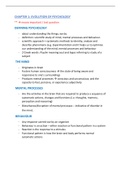Summary
Summary SLK 110 & SLK 120 Notes
- Course
- Institution
These are in-depth notes, using both the textbook and the lecture slides as well as extra information that was provided during lectures. They are sure to guide you to a distinction!
[Show more]



